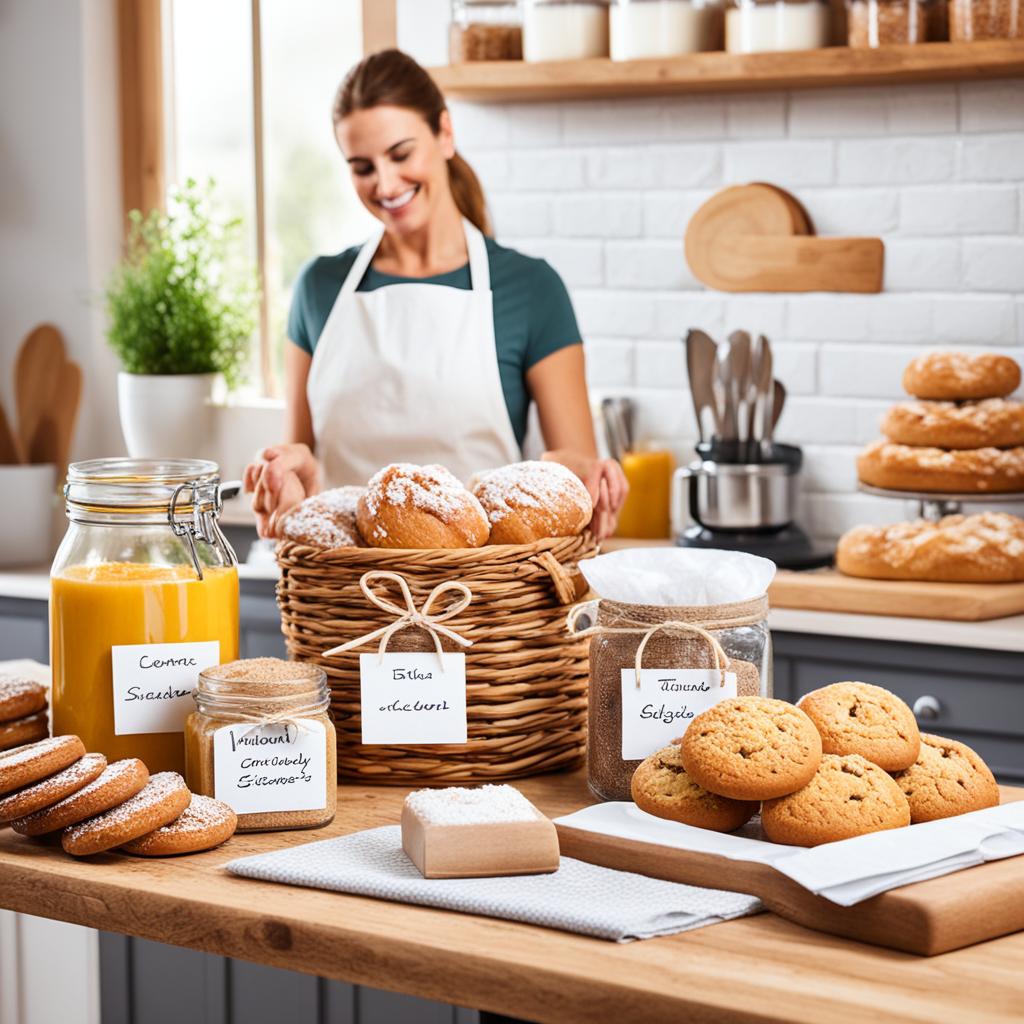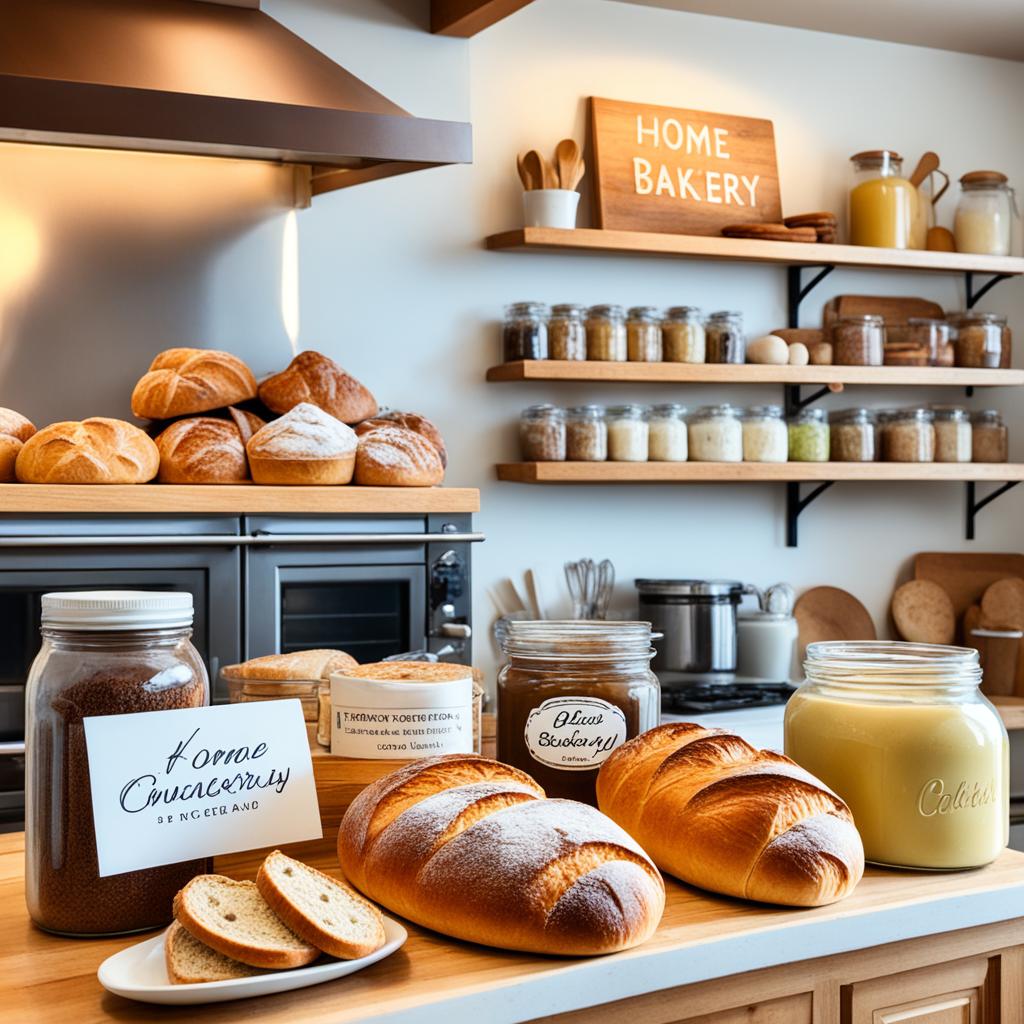Welcome to the ultimate guide to starting a profitable home bakery business! Whether you are looking to turn your baking passion into a full-time career or start a side hustle from the comfort of your own kitchen, this guide will provide you with all the information you need to succeed. With step-by-step instructions, expert advice, and valuable insights, you’ll be well-equipped to launch and grow your home bakery business with confidence.
Aspiring home bakers are often faced with questions and doubts about how to get started. That’s where this guide comes in. I’ll walk you through the gradual process of building a home bakery business and help you navigate each phase with ease. From testing the market in the initial stages to scaling up your operations and establishing a strong customer base, you’ll learn the key strategies and best practices for success.
But before we dive into the details, let me introduce myself. My name is [Your Name], and I have been running a thriving home bakery business for [Number of Years]. Over the years, I have gained extensive knowledge and practical experience in the baking industry. Now, I’m excited to share my insights and tips with you, so you can embark on your own baking journey.
Key Takeaways:
- Starting a home bakery business offers the flexibility to pursue your passion and potentially earn a significant income.
- By following this guide’s step-by-step instructions and expert advice, you’ll be well-prepared to start and grow your business.
- A gradual, strategic approach is key to building a successful home bakery business, so be patient and focused as you progress through each phase.
- Understanding the legal requirements, planning your menu, gathering the right equipment, and pricing your baked goods accurately are essential to your success.
- Developing a strong marketing strategy and establishing customer relationships are crucial for attracting and retaining loyal customers.
Understand the Gradual Process of Building a Home Bakery Business
Building a home bakery business is a journey that requires careful planning and strategic execution. It’s essential to recognize that success in this field takes time and effort. With the right approach and mindset, you can establish a sustainable and profitable home bakery. In this section, I will debunk common misconceptions about starting a home bakery and emphasize the significance of strategic planning in creating a flourishing business.
Debunking Misconceptions
There are several misconceptions surrounding home bakery businesses that can hinder aspiring entrepreneurs. Let’s dispel these myths and unveil the reality:
- Myth 1: Home bakery businesses are easy to set up and instantly profitable.
- Myth 2: You don’t need a business plan to start your home bakery.
- Myth 3: You don’t have to invest in marketing strategies.
By understanding these misconceptions, you can approach your home bakery venture with realistic expectations.
The Importance of Strategic Planning
Building a successful home bakery requires a solid business plan and a well-thought-out strategy. Careful planning enables you to set clear goals, define your target market, and outline the steps needed to achieve your objectives. It also helps you understand the financial aspects of your business, determine pricing strategies, and identify opportunities for growth and expansion.
Strategic planning allows you to anticipate challenges, make informed decisions, and establish a roadmap for your home bakery’s success.
Controlling the Pace of Growth
One advantage of a home bakery business is that you have control over the pace at which you grow. You can start small, gradually expanding your customer base and increasing production as you gain experience and confidence. This approach allows you to balance your personal commitments while building a solid foundation for your home bakery.
It’s essential to focus on quality and customer satisfaction during every stage of growth. By delivering exceptional products and exceptional service, you’ll build a loyal customer base that will support your business and contribute to its success.
To summarize, building a home bakery business is a gradual process that requires careful planning, patience, and persistence. By understanding the misconceptions, emphasizing strategic planning, and controlling the pace of growth, you can lay a solid foundation for long-term success in the home bakery industry.
Phase 1 – Starting Out
Welcome to Phase 1 of starting your home bakery business! This is an exciting time where you can begin to turn your passion for baking into a profitable venture. In this phase, you will get started and test the market to see how your baked goods are received. Let’s explore some small home bakery ideas to help you begin your journey.
One great way to start is by baking for friends, family, and acquaintances. This allows you to showcase your delicious creations and gather feedback from those closest to you. You can offer samples or even small batches of your baked goods to gauge interest and gather valuable insights.
Another option to consider is supplying baked goods to local establishments. Research local cafes, restaurants, or specialty food stores that may be interested in carrying your products. This helps you reach a wider audience and establish relationships with potential customers. It also provides an opportunity for you to refine your recipes and packaging based on customer feedback.
If you enjoy teaching and sharing your baking knowledge, hosting baking classes is a fantastic way to start your home bakery business. You can offer classes in your own kitchen or rent a community space. This not only generates additional income but also helps build your reputation as an expert in the baking community.
This phase allows you to start small and gradually build up your skills and customer base while still maintaining other responsibilities. It’s important to focus on improving the quality of your baking during this phase and obtaining the necessary certificates and licenses.
- Custom decorated cookies for special occasions or events
- Specialty cupcakes with unique flavors or fillings
- Gourmet bread with artisanal ingredients
- Healthy and allergy-friendly desserts
- Signature cakes with personalized designs
By experimenting with different products and listening to customer feedback, you can refine your offerings and develop a unique niche in the market.
Testimonials
“Starting out as a home baker was both exciting and nerve-wracking. I started by baking cupcakes for my coworkers, and their positive reactions motivated me to take the next steps. Now, I have a thriving home bakery business, and I’m proud of how far I’ve come.”
– Rebecca Thompson, Owner of Sweet Treats Bakery
“Phase 1 is all about exploring different opportunities and finding your target audience. Don’t be afraid to experiment and try new things. It’s all part of the learning process and can lead to unexpected success.”
– Michael Ramirez, Professional Baker
Table 1: Starting Out Checklist
| Task | Status |
|---|---|
| Obtain necessary licenses and permits | Not Started |
| Research local establishments for potential partnerships | In Progress |
| Collect feedback from friends and family | Completed |
| Explore baking class opportunities | In Progress |
| Refine recipes based on customer feedback | Not Started |
Remember, starting out is just the beginning of your home bakery business journey. Stay focused, keep refining your skills, and have faith in your talent. Your dedication and passion will take you far!
Phase 2 – Growing Your Home Bakery
In phase 2 of your home bakery business journey, it’s time to focus on expanding and growing your customer base. This phase entails strategic efforts to increase production, diversify your menu offerings, and explore new sales channels to reach a wider audience.
Increasing Production
To meet the growing demand for your delicious baked goods, consider ramping up your production. This could involve investing in additional equipment or streamlining your baking process to increase efficiency. By producing more, you’ll be able to fulfill larger orders and cater to a larger customer base.
Diversify Your Menu Offerings
While it’s important to have core menu items that your customers love, expanding your menu can attract new customers and keep existing ones coming back for more. Consider introducing new flavors, seasonal specialties, or unique baked goods that set you apart from competitors. Diversifying your menu creates excitement and gives customers more reasons to choose your home bakery.
Exploring New Sales Channels
In today’s digital age, it’s essential to explore new sales channels beyond traditional storefronts. Consider establishing an online presence through a website or social media platforms where customers can place orders or inquire about your products. You can also consider participating in local farmer’s markets, collaborative pop-up events, or partnering with local establishments to expand your reach.
Continued Skill Improvement
As you grow your home bakery business, don’t forget to invest time and effort into improving your baking skills. Stay updated on the latest baking techniques, experiment with new recipes, and continue to refine your craft. By constantly improving your skills, you’ll be able to offer exceptional products that keep customers coming back for more.
Effective Marketing Strategies
Implementing effective marketing strategies is crucial for expanding your customer reach. Consider leveraging social media platforms to showcase your mouthwatering creations, collaborating with influencers or local bloggers, and offering promotions or discounts to attract new customers. Additionally, encourage your satisfied customers to spread the word about your home bakery through positive reviews and testimonials.
Investment in Additional Equipment and Hiring Help
As your home bakery business grows, you may find it necessary to invest in additional equipment and consider hiring help to meet the increasing demand. Assess your production needs and determine if acquiring more equipment, such as mixers or ovens, will enhance your efficiency and capacity. If you’re struggling to handle the workload on your own, hiring part-time assistants or collaborating with other home bakers can relieve the pressure and ensure consistent product quality.
By following these tips and strategies for growing your home bakery business, you’ll be well on your way to establishing a successful and lucrative venture from the comfort of your own kitchen.
Phase 3 – Scaling Up to Full-Time Home Baking
In phase 3 of your home bakery business journey, you’ll achieve the exciting milestone of transitioning to full-time home baking. This phase is all about taking your business to the next level by expanding your production capacity, refining your menu offerings, and establishing a strong brand presence.
As you scale up your home bakery, there are several key aspects to focus on:
- Expanding production capacity: To meet the growing demand for your delicious baked goods, you’ll need to invest in additional equipment and streamline your baking processes. This will allow you to increase your production volume without compromising on quality.
- Refining menu offerings: Take the time to analyze customer preferences and identify which baked goods are most popular. This will help you optimize your menu by focusing on the items that generate the highest demand and profitability.
- Establishing a strong brand presence: Building a recognizable and trusted brand is crucial for long-term success. Invest in branding elements like a logo, website, packaging, and social media presence to create a cohesive and professional image for your home bakery.
While scaling your home bakery business, it’s important to keep a close eye on your finances and maintain accurate records of your sales and expenses. Tracking your financial performance will enable you to make informed decisions and ensure the sustainability of your business.
By creating a solid business plan and setting realistic growth goals, you’ll be able to navigate the challenges of scaling up your home bakery with confidence.
To help you visualize your journey in phase 3, here’s a table summarizing the key steps:
| Phase 3 Steps | Description |
|---|---|
| Expand production capacity | Invest in additional equipment and optimize baking processes to increase production volume. |
| Refine menu offerings | Analyze customer preferences and focus on the most popular and profitable baked goods. |
| Establish a strong brand presence | Invest in branding elements like a logo, website, packaging, and social media presence. |
| Manage finances | Track sales, expenses, and profitability to ensure the financial sustainability of your business. |
| Create a solid business plan | Set growth goals and develop a strategic roadmap for scaling up your home bakery. |
Take your home bakery business to new heights by strategically scaling up your operations in phase 3. With careful planning, attention to your brand, and efficient production processes, you’ll be well on your way to fulfilling your dream of running a successful full-time home baking business.
Know the Legal Requirements for a Home Bakery Business
Before starting a home bakery business, it’s crucial to understand the legal requirements in your area. This section will guide you through the process of obtaining the necessary licenses and permits, including health department certifications and food manager licenses. It will also explain the importance of creating a separate business entity, such as a limited liability company (LLC), and provide tips for organizing your finances and planning for taxes.
Starting a home bakery business involves compliance with local regulations and licensing requirements. Failure to follow these legal obligations can result in fines, closure of your business, and even legal action. Therefore, it’s important to familiarize yourself with the specific laws and regulations applicable to home-based food businesses in your area.
Obtaining the Necessary Licenses and Permits
One of the key legal requirements for a home bakery business is obtaining the necessary licenses and permits. The specific licenses and permits required may vary depending on your location, so it’s essential to research and comply with the regulations specific to your area.
The following are common licenses and permits you may need to operate a home bakery business:
- Bakery License: This license allows you to legally operate a bakery business from your home.
- Food Handler’s Permit: A food handler’s permit demonstrates that you have received proper food safety training and are knowledgeable about safe food handling practices.
- Health Department Certification: Depending on your jurisdiction, you may be required to obtain certification from the health department to ensure that your home bakery meets health and safety standards.
- Food Manager License: In some areas, the person in charge of the food preparation and handling at your home bakery may be required to hold a food manager license.
It’s important to research and contact your local health department to determine the specific requirements and procedures for obtaining the necessary licenses and permits for your home bakery business. They will be able to provide you with the most up-to-date information and guide you through the application process.
Creating a Separate Business Entity
When starting a home bakery business, it’s often advisable to create a separate legal entity for your business. This provides several advantages, including personal liability protection and potential tax benefits.
One common legal entity used for small businesses is a limited liability company (LLC). An LLC offers personal liability protection, meaning your personal assets are generally protected in the event of legal claims or debts related to your business. It also provides flexibility in terms of taxation, allowing you to choose how your business income is taxed.
Consult with a qualified attorney or a legal professional to determine the best business structure for your specific situation and to ensure compliance with all legal requirements.
Organizing Your Finances and Planning for Taxes
Proper financial organization and tax planning are essential for the success and legality of your home bakery business. It’s important to separate your personal and business finances by setting up a dedicated bank account for your business transactions. This will make it easier to track income and expenses, calculate profits, and file accurate tax returns.
You should also keep detailed financial records, including income and expense statements, invoices, receipts, and any relevant tax documents. These records will help you accurately report your income and expenses at tax time.
Consult with a tax professional to understand the specific tax obligations for your home bakery business and to ensure compliance with all tax laws. They can provide guidance on record-keeping, deductions, and any applicable tax credits or incentives.
Understanding and complying with the legal requirements for a home bakery business is essential for ensuring the success and sustainability of your venture. By obtaining the necessary licenses and permits, creating a separate business entity, and organizing your finances properly, you can confidently operate your home bakery business within the bounds of the law.
Plan Your Bakery Menu
Planning your bakery menu is a crucial step in starting a successful home bakery business. The menu you create will not only showcase your baking skills but also cater to the preferences of your potential customers. By offering a range of delicious baked goods, you can attract a wider audience and increase your chances of success.
When deciding on your bakery menu, consider the small home bakery ideas that align with your skills and expertise. Think about the baked goods that you enjoy making the most and are confident in producing consistently. This will ensure that you can deliver high-quality products that satisfy your customers.
Some popular items that you may want to include in your bakery menu are:
- Delicious cookies in a variety of flavors – from classic chocolate chip to unique combinations like salted caramel.
- Delectable muffins with different flavors and toppings, such as blueberry, banana nut, or streusel.
- Scrumptious cakes for special occasions, including classic flavors like vanilla and chocolate, as well as more adventurous options like red velvet or lemon raspberry.
- Freshly baked bread in different varieties, such as sourdough, whole wheat, or artisanal loaves.
It’s important to consider offering shelf-stable products that don’t require refrigeration, as this will allow you to expand your customer base and potentially sell your baked goods online or through local retailers.
“By offering a variety of baked goods that cater to different tastes and dietary preferences, you can attract a wider customer base and increase your chances of success.”
Flexibility is also key when planning your bakery menu. Consider offering seasonal items or limited-time specials to keep your menu fresh and exciting. This can create a sense of urgency and encourage repeat customers. Don’t be afraid to experiment with new recipes and flavors, as this can set your home bakery apart from competitors and attract customers seeking unique treats.
Remember, your bakery menu is a reflection of your skills and creativity as a baker. It’s an opportunity to showcase your unique offerings and entice customers with mouthwatering treats. By carefully planning your bakery menu and offering a variety of delicious baked goods, you’ll be well on your way to starting a successful bakery business right from the comfort of your own home.
Gather Your Equipment and Supplies
In order to turn your home baking into a business, it’s essential to have the right equipment and supplies. Here’s a comprehensive guide to help you gather everything you need to set up your home bakery.
1. Baking Equipment:
- Baking pans
- Mixing bowls
- Piping bags
- Measuring cups and spoons
- Oven mitts
- Whisk
- Spatula
- Cooling racks
- Cake slicer
- Pie weights
- Cake decorating tools
2. Ingredients:
Sourcing high-quality ingredients is crucial for producing delicious baked goods. Consider these tips:
“Buying ingredients in bulk can help save costs and ensure a steady supply. Look for wholesale suppliers or consider joining a local baking co-op to access affordable ingredients. Don’t forget to check the expiration dates and storage instructions for each ingredient to maintain optimal freshness.”
3. Labeling and Packaging:
- Label each product with essential information such as name, ingredients, allergens, and expiration date.
- Invest in suitable packaging materials such as boxes, bags, or containers that are sturdy and present your products well.
4. Organize Your Kitchen Space:
Creating an organized and efficient kitchen is crucial for a home bakery business. Consider these tips:
“Separate your baking tools and ingredients from personal items to maintain cleanliness and prevent cross-contamination. Designate specific areas for different tasks, such as a baking station, storage area, and cleaning station. Make sure to comply with health department regulations regarding kitchen hygiene and sanitation.”
With the right equipment, high-quality ingredients, and an organized workspace, you’ll be well-prepared to kick-start your home bakery business.
Understand How to Price Your Baked Goods
Pricing your baked goods correctly is crucial for maintaining profitability in your home bakery business. When determining the appropriate pricing for your products, it’s important to consider several factors, including your food costs, labor costs, overhead costs, and the value of your skills and time. By calculating these costs and setting competitive prices, you can ensure that your business remains sustainable and competitive in the market.
Here are some tips to help you price your baked goods effectively:
- Calculate your food costs: Determine the cost of ingredients for each recipe or product. Consider the quantity used and the price per unit.
- Factor in your labor costs: Estimate the time it takes to prepare each item and assign a value to your time. This will help account for the effort you put into your baking.
- Consider your overhead costs: Take into account the expenses associated with running your home bakery, such as rent, utilities, packaging, and marketing.
- Research the market: Check the prices of similar baked goods in your area or online. Use this information as a reference to ensure your prices are competitive.
- Track your expenses and sales: Keep detailed records of your costs and monitor your sales to evaluate the profitability of each product. This will help you identify any pricing adjustments that may be necessary.
Remember, pricing your baked goods is a balancing act. While you want to set prices that cover your costs and generate profit, you also need to consider market demand and customer willingness to pay. Always strive for fair and competitive prices that reflect the value you provide.

A visually appealing and relevant image related to turning home baking into a business.
Develop Your Marketing Strategy
Effective marketing is crucial for the success of your home bakery business. Here are some tips and strategies to help you promote your products and attract customers.
Create a Professional Online Presence
Building a professional website and establishing a strong social media presence is essential in today’s digital age. A well-designed website will showcase your bakery’s offerings, provide contact information, and allow customers to place orders online. Utilize social media platforms, such as Facebook and Instagram, to engage with your audience, showcase your baked goods through visually appealing images, and announce promotions or new products.
Participate in Local Events and Farmer’s Markets
Engaging with your local community is a fantastic way to spread the word about your home bakery. Consider participating in local events, such as food festivals or bake sales, to showcase your products to a wider audience. Farmer’s markets are also a great avenue to connect directly with potential customers and receive valuable feedback on your baked goods.
Leverage Word-of-Mouth Referrals
Word-of-mouth referrals play a crucial role in growing your customer base. Encourage your satisfied customers to share their positive experiences with friends, family, and coworkers. Consider implementing a referral program where customers receive incentives, such as discounts or freebies, for referring new customers to your bakery.
“Word-of-mouth referrals are like icing on the cake – they spread the sweetness of your baking business far and wide!”
Build a Strong Brand
Creating a compelling and cohesive brand identity will help your bakery stand out from the competition. Develop a unique logo, choose a consistent color palette, and establish a distinctive visual style for your marketing materials and packaging. Your brand should reflect the values and personality of your bakery, resonating with your target audience and leaving a lasting impression.
Engage with Customers
Customer engagement is key to fostering loyalty and building a strong customer base. Respond promptly to customer inquiries or feedback, whether it’s through social media, email, or phone calls. Consider implementing a customer loyalty program or offering personalized touches, such as handwritten notes or special discounts, to show your appreciation.
Marketing Channels Comparison
| Marketing Channel | Pros | Cons |
|---|---|---|
| Website and Social Media | Wide reach, 24/7 accessibility, cost-effective | Requires time and effort to maintain and update |
| Local Events and Farmer’s Markets | Direct customer interaction, immediate feedback | Limited availability and scheduling constraints |
| Word-of-Mouth Referrals | Trustworthy recommendations, low cost | Relies on customer satisfaction and external factors |
By implementing a comprehensive marketing strategy that combines online and offline channels, you’ll maximize your reach and increase awareness of your home bakery business. Remember to consistently evaluate your marketing efforts, track results, and refine your strategies to ensure continued success.
Establish Strong Customer Relationships
Building strong relationships with your customers is essential for the long-term success of your home bakery business. When customers feel valued and appreciated, they are more likely to become loyal supporters who not only continue to purchase your delicious baked goods but also recommend your business to others. In this section, I will provide you with valuable advice on how to provide excellent customer service, exceed customer expectations, and encourage repeat business.
Personalized Touches that Make a Difference
One of the key ways to establish strong customer relationships is by adding personalized touches to your interactions. Small gestures can go a long way in making your customers feel special and valued. Consider including handwritten thank-you notes or special promotions with each order to show your appreciation. These touches add a personal and unique element to your business, making customers feel like they are part of a special community. Remember, it’s the little things that leave a lasting impression.
Effective Communication and Channels
Communication plays a vital role in building strong customer relationships. It’s important to be accessible to your customers and respond promptly to their inquiries or feedback. Utilize various channels to effectively communicate with your customers, such as email, social media, or phone. Each channel serves a different purpose, so it’s essential to understand your target audience and their preferred communication methods. By being responsive and attentive, you will create a positive experience for your customers and foster trust in your brand.
Exceeding Customer Expectations
Exceeding customer expectations is a surefire way to leave a lasting impression. Strive to provide exceptional customer service every time, ensuring that your customers’ needs are met and even surpassed. This can be achieved through attention to detail, prompt delivery, and consistently high-quality products. By consistently exceeding expectations, you’ll cultivate a loyal customer base that will not only return for more but also spread the word about your exceptional bakery business.
Quotes from Satisfied Customers
“I have never experienced such personalized service from a home bakery before. The handwritten note included in my order made me feel appreciated as a customer. Not to mention, the pastries were absolutely divine!” – Emily S.
“The communication with the bakery was excellent. They promptly replied to my queries and ensured that my order was exactly what I wanted. The whole experience exceeded my expectations, and I can’t wait to order again!” – David M.
Going the Extra Mile for Customer Satisfaction
Go above and beyond to ensure customer satisfaction with every interaction. Offer personalized recommendations based on customer preferences, provide special promotions or discounts for loyal customers, and address any concerns or issues promptly and professionally. By consistently going the extra mile, you’ll build trust and loyalty with your customers, making them feel valued and appreciated.
Remember, establishing strong customer relationships is an ongoing process. Continuously strive to improve and exceed customer expectations, actively listen to their feedback, and adapt your strategies accordingly. By prioritizing customer satisfaction, your home bakery business will thrive and enjoy long-term success.
Continuously Improve Your Baking Skills
As a home baker, I understand that continuously improving my baking skills is crucial for staying competitive and delivering high-quality products. By constantly refining my skills and staying updated on the latest trends and best practices, I am able to offer unique and delicious baked goods that set my home bakery apart.
Here are some tips and resources that I find helpful in honing my baking skills:
- Attend baking classes or workshops: Participating in formal training programs or workshops can provide valuable techniques and knowledge from experienced bakers. It’s an opportunity to learn new recipes, refine existing skills, and gain insights into professional baking methods.
- Experiment with new recipes and techniques: Trying out new recipes and techniques is an excellent way to expand your baking skills. Don’t be afraid to step out of your comfort zone and explore different flavor combinations and decorative designs.
- Seek feedback from customers or industry professionals: Customer feedback is invaluable in identifying areas for improvement. Encourage your customers to provide honest feedback about your products and take their suggestions into account. Additionally, consider connecting with other bakers or joining baking communities where you can exchange ideas and receive constructive criticism.
“Continuous learning and improvement are the key ingredients for success as a home baker. Embrace new challenges, experiment fearlessly, and seek feedback from others to elevate your baking skills.” – [Your Name]
By dedicating time and effort to enhancing your baking skills, you can elevate the quality of your products and create a memorable experience for your customers. Remember to stay curious, be open to learning, and enjoy the process of mastering new techniques.
Additional Resources:
- The Kitchn’s Online Baking Courses
- Craftsy’s Online Baking Classes
- MasterClass: Dominique Ansel Teaches French Pastry Fundamentals
Takeaways and Next Steps
Starting a home bakery business can be an exciting and rewarding venture. As we wrap up this comprehensive guide, let’s summarize the key takeaways and explore what your next steps should be to turn your baking passion into a profitable business.
- Continue learning and growing as a home baker: The world of baking is constantly evolving, and there’s always something new to learn. Stay updated on the latest baking techniques, trends, and flavor combinations. Consider attending baking classes, workshops, or online courses to further refine your skills and expand your knowledge.
- Seek mentorship or support: Connect with other industry professionals, experienced home bakers, or local business support groups. Networking and seeking guidance from those who have already built successful home bakery businesses can provide invaluable insights and advice.
- Adapt your business strategies: Keep an eye on market trends and customer preferences. Regularly assess and adjust your menu offerings, pricing strategies, and marketing efforts to meet the evolving needs of your target audience. Be open to experimenting with new recipes and exploring innovative ways to showcase your baked goods.
“The only way to do great work is to love what you do.” – Steve Jobs
With dedication, perseverance, and a passion for baking, you have the potential to build a successful and fulfilling home bakery business. Remember that Rome wasn’t built in a day, so be patient and persistent in your journey. Embrace challenges as opportunities for growth and learning.
Next Steps:
Now that you have a solid foundation, here are some important next steps to consider:
- Refine your business plan: Take time to review and update your business plan, considering the knowledge and insights gained from this guide.
- Set realistic goals: Define your short-term and long-term goals. Establish milestones and timelines to track your progress.
- Invest in marketing: Implement an effective marketing strategy to promote your home bakery business. Leverage social media platforms, collaborate with influencers, and explore local advertising opportunities.
- Optimize your operations: Continuously improve your baking processes, streamline your workflow, and consider investing in additional equipment or hiring help if needed.
- Stay compliant: Ensure you comply with all legal and regulatory requirements specific to home-based baking businesses in your area. Regularly review health department certifications, permits, and other necessary licenses.
- Nurture your customer relationships: Maintain strong connections with your customers through personalized and exceptional customer service. Encourage feedback and implement suggestions to enhance their experience.
Remember, building a successful home bakery business requires passion, dedication, and continuous learning. Stay true to your baking style while exploring new horizons. With the right mindset and a commitment to excellence, you can create a thriving and fulfilling home bakery business.
| Key Points | Benefits |
|---|---|
| Sustained learning and growth | – Stay updated on baking techniques and flavors – Expand your knowledge and skillset |
| Mentorship and support | – Gain insights from experienced home bakers – Connect with industry professionals |
| Adaptation and innovation | – Stay in tune with market trends and preferences – Experiment with new recipes and approaches |
Conclusion
Starting a home bakery business is an exciting and rewarding venture. It requires careful planning, dedication, and a passion for baking. By following the steps and advice outlined in this guide, you can confidently embark on this entrepreneurial journey and create a thriving bakery from the comfort of your home.
Throughout the process, it is important to continuously improve your baking skills. Attend baking classes, experiment with new recipes and techniques, and seek feedback from customers or industry professionals. By honing your skills, you will be able to offer unique and delicious baked goods that will set your home bakery apart.
Building strong customer relationships is another key factor for success. Provide excellent customer service, exceed their expectations, and communicate effectively through various channels. By prioritizing customer satisfaction, you will create loyal customers who will support and recommend your business.
As your business grows, be willing to adapt your strategies. This includes adapting your menu offerings, expanding your customer reach through effective marketing, and investing in necessary equipment and supplies. With a strategic approach and unwavering determination, you can turn your home baking into a profitable and fulfilling business.
FAQ
How do I start a profitable home bakery business?
What is the gradual process of building a home bakery business?
How can I start out in the home bakery business?
How can I grow my home bakery business?
How do I scale up to full-time home baking?
What are the legal requirements for a home bakery business?
How do I plan my bakery menu?
What equipment and supplies do I need for a home bakery?
How do I price my baked goods correctly?
What is an effective marketing strategy for a home bakery business?
How can I establish strong customer relationships for my home bakery business?
How can I continuously improve my baking skills?
What are the next steps for starting a home bakery business?
Source Links
- https://www.escoffier.edu/blog/food-entrepreneurship/how-to-start-bakery-business-from-home/
- https://philosophyofyum.com/the-ultimate-guide-to-starting-a-home-bakery-business/
- https://www.simplybusiness.com/simply-u/articles/2022/02/how-to-start-a-home-bakery/
Money posts:
 23 Best Ways to Make Money Delivering (2024)
23 Best Ways to Make Money Delivering (2024)
 26 Best Hobbies That Make Money in 2024
26 Best Hobbies That Make Money in 2024
 Side Gigs: A Beginner’s Guide – 12 Easy Ideas to Get Started
Side Gigs: A Beginner’s Guide – 12 Easy Ideas to Get Started
 10 Best Entry-Level Digital Marketing Jobs (2024)
10 Best Entry-Level Digital Marketing Jobs (2024)
 How to Become a Digital Marketer (2024 Guide)
How to Become a Digital Marketer (2024 Guide)
 How To Earn Extra Income With Affiliate Marketing (2024)
How To Earn Extra Income With Affiliate Marketing (2024)
 Best Side Hustles for Couples to Earn Extra Cash in 2024
Best Side Hustles for Couples to Earn Extra Cash in 2024
 How to Start a Digital Marketing Agency With No Experience
How to Start a Digital Marketing Agency With No Experience

